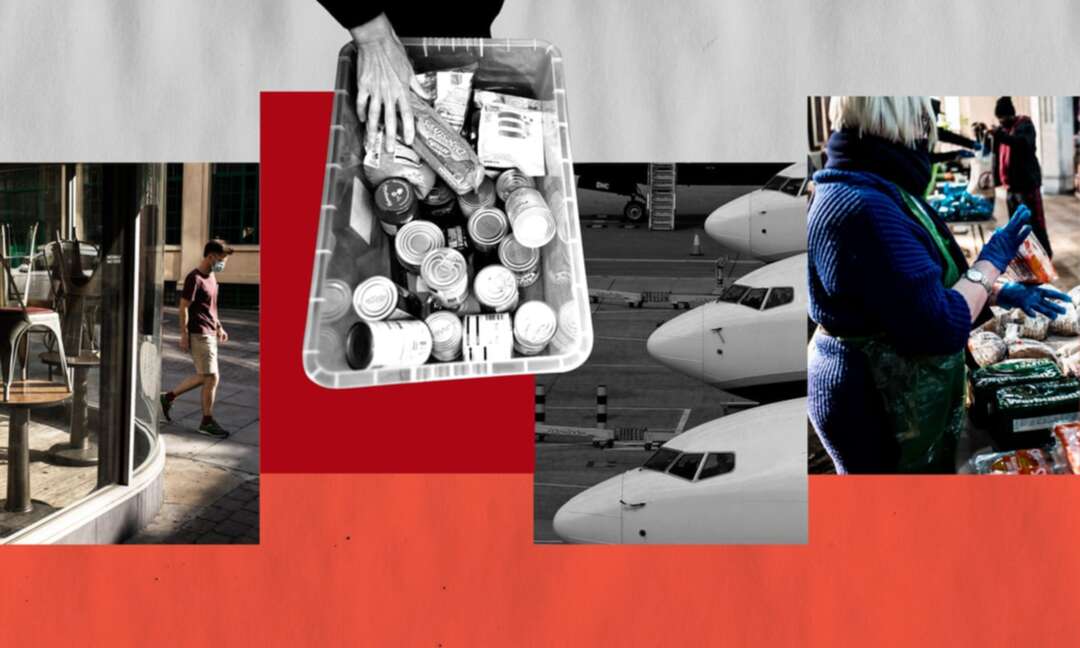-
Britain's Covid unemployed: 'I’m broke. I'm going to the food bank for handouts'

British people who have lost their jobs due to the pandemic tell their storiesThe Guardian spoke to people who have been made unemployed due to Covid and their experiences of trying to find work.
David Omokhoje, 55, from Westcliff, Essex, was made redundant in October from his job as a chef in a restaurant off Sloane Square in London. “The last day of meaningful life for me was 16 March when I last went to work,” he says. “We went from 450+ covers for breakfast and lunch at the start of 2020 to less than 100 in the third week of March.”
Omokhoje found the first few months of furlough “manageable” but in July he was informed that unless he signed a zero-hours contract he would be made redundant. “It was devastating. A season ticket costs around £460 a month and I wouldn’t have been able to commit to paying for one. Financially it just wasn’t viable.
“I received my last pay in November and my first universal credit payment wasn’t due until January. Unsurprisingly, my money ran out. I’m broke. I’m having to go to the Citizens Advice Bureau for gas and electricity vouchers and the food bank for handouts.”
Since losing his job Omokhoje has found lockdown difficult. “Living in and not socialising fully was getting on top of me. I could feel myself going down and eventually I went to see my GP and said I was depressed. It’s not a unique story though.
“It’s not been an easy time as a lot of the facilities that would normally be available are not because everyone seems short staffed.”
He has applied for “hundreds” of jobs, many of them on minimum wage, which he thinks is “disgusting”. “Nobody, even someone who is unskilled, should be expected to earn less than £10 an hour. You just can’t live on that.
“It’s quite hard and I don’t feel I’m contributing to society, but it will get better.”
“Everyone is missing their old life,” says Clare, 53, from Glasgow, a former cabin crew member with a large airline operator. “Even when I was made redundant I thought I’d be going back – I think a part of me still thinks I will.”
She crewed her last flight in March and was furloughed until she lost her job of five years in September. “The ground staff came to wave us off and there was an eerie feeling of sadness, fear and disbelief. At that point we could never have imagined what would unfold over the coming months.”
Financially she and her husband have been able to manage because he still works, but she is worried about her mental health. “It’s affected my sense of self-worth; I thought I would be there until my late 50s but then you’re thrown into a situation where you don’t know what to do next.
“Almost a year on and I still gasp when I see an aircraft in the sky because I want to be on it – I want to be the crew and I want to be the passenger. Something that was part of my identity is no longer an option. Everything has changed – the company that I thought was rock solid and literally flying high is, like most of its competitors, a shadow of its former self and, I suppose, I am too.”
source: Rachel Obordo
Levant
You May Also Like
Popular Posts
Caricature
BENEFIT Sponsors BuildHer...
- April 23, 2025
BENEFIT, the Kingdom’s innovator and leading company in Fintech and electronic financial transactions service, has sponsored the BuildHer CityHack 2025 Hackathon, a two-day event spearheaded by the College of Engineering and Technology at the Royal University for Women (RUW).
Aimed at secondary school students, the event brought together a distinguished group of academic professionals and technology experts to mentor and inspire young participants.
More than 100 high school students from across the Kingdom of Bahrain took part in the hackathon, which featured an intensive programme of training workshops and hands-on sessions. These activities were tailored to enhance participants’ critical thinking, collaborative problem-solving, and team-building capabilities, while also encouraging the development of practical and sustainable solutions to contemporary challenges using modern technological tools.
BENEFIT’s Chief Executive Mr. Abdulwahed AlJanahi, commented: “Our support for this educational hackathon reflects our long-term strategic vision to nurture the talents of emerging national youth and empower the next generation of accomplished female leaders in technology. By fostering creativity and innovation, we aim to contribute meaningfully to Bahrain’s comprehensive development goals and align with the aspirations outlined in the Kingdom’s Vision 2030—an ambition in which BENEFIT plays a central role.”
Professor Riyadh Yousif Hamzah, President of the Royal University for Women, commented: “This initiative reflects our commitment to advancing women in STEM fields. We're cultivating a generation of creative, solution-driven female leaders who will drive national development. Our partnership with BENEFIT exemplifies the powerful synergy between academia and private sector in supporting educational innovation.”
Hanan Abdulla Hasan, Senior Manager, PR & Communication at BENEFIT, said: “We are honoured to collaborate with RUW in supporting this remarkable technology-focused event. It highlights our commitment to social responsibility, and our ongoing efforts to enhance the digital and innovation capabilities of young Bahraini women and foster their ability to harness technological tools in the service of a smarter, more sustainable future.”
For his part, Dr. Humam ElAgha, Acting Dean of the College of Engineering and Technology at the University, said: “BuildHer CityHack 2025 embodies our hands-on approach to education. By tackling real-world problems through creative thinking and sustainable solutions, we're preparing women to thrive in the knowledge economy – a cornerstone of the University's vision.”
opinion
Report
ads
Newsletter
Subscribe to our mailing list to get the new updates!






















